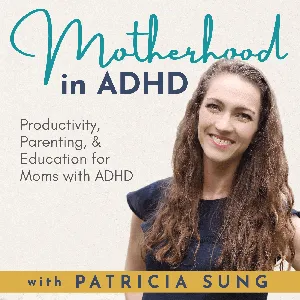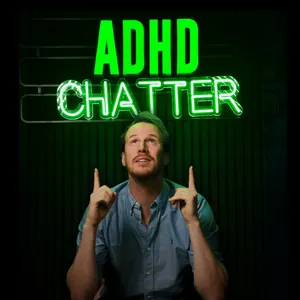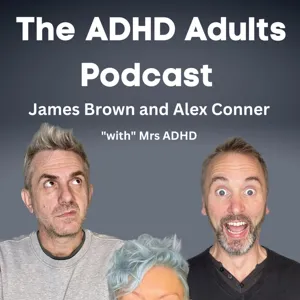Podcast Summary
Exploring ADHD: Understanding its Impact and Embracing Its Strengths: ADHD is a neurodevelopmental disorder with measurable brain differences, not a result of poor parenting or lack of discipline. Embrace self-care and understanding to overcome stigmas and access necessary accommodations.
ADHD is a real neurodevelopmental disorder, not a result of bad parenting or lack of discipline. It's the most well-researched mental condition, and there are measurable differences in the brain that persist into adulthood. The last few years have shifted the perspective on what support for people with ADHD looks like, and it's important to prioritize self-care, such as setting boundaries and learning to say no. In this episode of Ologies, Ally Ward talks with three experts – Jessica McCabe, Renee Brooks, and neuroscientist Jayla Osborne – about the strengths of an ADHD brain, notable people with ADHD, the struggles of obtaining medication, stigmas, accommodations, and more. The experts share their personal experiences and insights, emphasizing that ADHD is not just a disorder for someone else's nephew or a reason for underperformance. It's a unique way of thinking and processing information that deserves understanding and acceptance.
Discovering ADHD through unexpected means: The importance of being open to unexpected conversations and seeking professional help can lead to valuable insights and diagnoses, particularly for neurodivergent individuals.
The importance of being mindful about committing to too many yeses, as Renee Brooks of Black Girl Lost Keys advises, was exemplified in the host's own experience with receiving an ADHD diagnosis. The host discovered her ADHD not through online resources but through a chance conversation with her therapist. The host's diagnosis was a relief as it provided a new understanding of her experiences and challenges. The last few years have seen a surge in discussions about mental health and neurodiversity, leading to an increase in ADHD diagnoses. The demands of society can sometimes be too much for individuals to handle without proper support, leading to a breaking point and eventual diagnosis. The host's personal experience echoes this, as the sudden change in her life during middle school overwhelmed her executive function abilities.
Challenges in ADHD Diagnosis for Underrepresented Communities: Seek out culturally competent doctors for ADHD diagnosis, especially in underrepresented communities where diagnoses may be less common and stigma more prevalent. Undiagnosed ADHD can lead to negative self-image and long-term consequences.
The journey to an ADHD diagnosis can be particularly challenging for individuals who have been overlooked due to systemic biases based on race or gender. These individuals may face skepticism from doctors who assume that ADHD is a condition typically diagnosed in childhood, or they may be dismissed as having behavioral problems instead. It's crucial for those who suspect they have ADHD but haven't been diagnosed to seek out culturally competent doctors who specialize in ADHD and understand its complexities. This is especially important for underrepresented communities where diagnoses may be less common and stigma may be more prevalent. The consequences of undiagnosed and untreated ADHD can be severe, leading to negative self-image and long-term consequences. The rise in diagnoses can be attributed to increased awareness and access to information, but it also highlights the need for more education and understanding of ADHD in schools and healthcare systems.
Researching Distractibility in ADHD and Race Biases: University of Michigan PhD student Jayla Osborne is investigating if individuals with ADHD are equally susceptible to external and internal distractions or if they're specifically susceptible to a certain type, while Renee, a diagnosed adult, created Black Girl Lost Keys and the Unicorn Squad to support marginalized communities discussing ADHD.
Research on distractibility within ADHD and race biases in perceptions of ADHD symptoms is ongoing, with University of Michigan PhD student Jayla Osborne leading the charge. Her research focuses on assessing if individuals with ADHD are equally susceptible to external and internal distractions or if they're specifically susceptible to a certain type. Currently, her work is primarily survey-based, but she's gearing up for a second study using computer tasks with embedded external distractions. The field of neuroscience is making strides in understanding the brain through various tasks and studies, even incorporating elements of humor and pranksterism. Renee, who was diagnosed with ADHD as a child but never told what it meant, went on to create Black Girl Lost Keys and the Unicorn Squad, a support group and safe space for black people of marginalized genders to discuss ADHD. The lack of accessibility during her diagnosis journey inspired her to make these resources available.
The Improved Availability of Resources for Individuals with ADHD: Despite progress, systemic and personal barriers persist for some individuals with ADHD, hindering proper diagnosis and support.
The availability and representation of resources for individuals with ADHD has significantly improved over the years, but there are still systemic and personal barriers that prevent some individuals from being diagnosed and receiving proper support. The speaker, who created a blog for black women with ADHD due to the lack of resources available at the time, expressed encouragement by the current state of resources but acknowledged the challenges that existed, and continue to exist, for those without access to evaluations or financial means. The speaker's motivation for her work comes from her brother's struggles with ADHD and the functional consequences that can result from the disorder. Additionally, there is an overlap between ADHD and autism, and the speaker has a personal interest in both conditions due to her experiences with neurodivergent individuals in her life.
Understanding and valuing neurodiversity: Neurodiversity brings unique perspectives and strengths, and accommodating differences leads to a more innovative and inclusive society
Neurodiversity, which includes differences in brains such as ADHD and autism, brings valuable perspectives and strengths to the world. Comparing neurotypical, ADHD, and autistic brains to different operating systems - Windows, Mac, and Linux - highlights the importance of understanding and accommodating these differences instead of trying to force them to conform. ADHD brains, for instance, may thrive in high-intensity, creative, and hands-on environments. The hunter-farmer hypothesis, though not scientifically proven, resonates with some people with ADHD and suggests that they might be well-suited for roles that require quick thinking and adaptability. Embracing neurodiversity leads to a more innovative and inclusive society.
Suppressing ADHD traits is harmful: Acceptance and celebrating ADHD strengths is beneficial, seek professional help for diagnosis and support.
Trying to conform to neurotypical standards and suppressing one's unique traits as a person with ADHD is not only unnecessary but also harmful. The speaker shares her personal experience of striving to overcome her ADHD symptoms to fit in and be successful, but eventually realizing that acceptance and celebrating her strengths is the better approach. This mindset shift not only benefits the individual but also creates a more inclusive world for future generations. If you suspect you have ADHD, it's essential to seek professional help to receive an accurate diagnosis and appropriate support. Additionally, organizations like CHaD and ADDA provide valuable resources for those dealing with attention deficit hyperactivity disorder.
Understanding and validating experiences of individuals with ADHD: Emphasize intelligence is not affected by ADHD, patience, understanding, and exploring different options are crucial when dealing with ADHD.
The discussion highlighted the importance of understanding and validating the experiences of individuals with ADHD, whether they are creators, formerly incarcerated individuals, or anyone else. Anika shared her experience of being diagnosed with ADHD and the initial shock and disbelief she faced, but now, she emphasizes that intelligence is not affected by ADHD. Russell Barkley's mission to legitimize the struggle was also mentioned as a valuable resource for those seeking understanding and validation. The conversation also touched upon the challenges of getting diagnosed and accessing medication, which can be a frustrating and time-consuming process. Some listeners asked about alternative medication strategies and shared their own experiences with anxiety and medication. Overall, the discussion underscored the importance of patience, understanding, and a willingness to explore different options when dealing with ADHD.
Navigating the process of finding the right ADHD medication: Be open with your doctor about how medications affect you, consider alternative medications or lifestyle changes, and be aware of food interactions.
Finding the right medication for ADHD can be a process of trial and error. It's essential to be open and honest with your doctor about how you feel on a particular medication, as there may be a different dose or alternative medication that could work better for you. Medication can be effective for up to 80% of people with ADHD, but it's not the only solution. Other strategies, such as non-stimulant medications or lifestyle changes, may be more suitable for some individuals. Additionally, medication doesn't teach skills, and some people may not respond well to it or may not be able to access it due to economic or logistical reasons. Therefore, it's crucial to understand that there are various tools and approaches available to manage ADHD symptoms. Lastly, be aware that acidic foods and vitamin C can affect the effectiveness of certain medications, and taking them with plenty of protein may help mitigate side effects like anxiety or jitters.
Advocate for yourself in managing ADHD: Self-advocate, find respectful healthcare pros, explore financial aid, remember societal value of neurodivergent individuals, and build a strong team for business success.
When it comes to managing ADHD and its treatment, it's essential to advocate for yourself and prioritize finding the right healthcare professional who respects your unique experiences and needs. Don't dismiss a medication's efficacy without considering how you're taking it and discussing with your doctor. If cost is a concern, explore financial assistance programs. Remember, you're the one hiring your clinician, and they should be a partner, not a boss. If you don't feel respected or heard, it's time to seek a new one. Moreover, society should make efforts to accommodate neurodivergent individuals, recognizing the valuable contributions they make, particularly in creative fields. Famous figures like Emma Watson, Simone Biles, and Leonardo da Vinci, among others, have been speculated to have ADHD. The ADHD brain, even undiagnosed, plays a significant role in society, and discouraging it would be a significant loss. Lastly, starting a business might seem daunting for those with ADHD, but it's essential to remember that asking for help and building a strong team can lead to great success. Fear of success can be just as debilitating as fear of failure. So, don't hesitate to ask for support and hire professionals to help manage aspects of your business.
Managing ADHD as an adult: Strategies, resources, and self-advocacy: Focus on results, not appearances. Learn strategies, advocate for accommodations, and live in a supportive world to manage ADHD effectively.
Managing ADHD as an adult involves a combination of strategies, resources, and self-advocacy. Success in various areas of life, whether it be in the workplace or personal goals, can lead to access to more resources to better cope with ADHD. It's essential to focus on results rather than appearances. For adults, there are fewer resources available compared to those in the school system. It's important to remember that the goal is not to become "perfect" with managing ADHD, but rather to live a life in line with one's values and contribute to society in a meaningful way. This may involve learning strategies, advocating for accommodations, and living in a world that supports neurodiversity. The journey towards managing ADHD is complex and ongoing, and it's essential to remember that nobody has all the answers. It's important to have the tools and strategies we need, but also to live in a world where these tools are accepted and supported. Additionally, small accommodations, such as using fidget toys or listening to music while working, can be helpful for managing executive function issues.
Managing Distractions for ADHD Success: Successful people with ADHD use strategies like breaks, planning, self-awareness, and the Pomodoro Technique to manage distractions and complete tasks effectively.
Successful people with ADHD have found strategies to manage their distractions and complete tasks effectively. Renee Peterson Trudeau, an ADHD coach, offers various resources such as water bottles with pill organizers, worksheets, and a podcast via Patreon. Neuroscientist Jayla Bellamy suggests taking breaks, planning work, and using the Pomodoro Technique with a timer. Adam Becker, an astrophysicist with ADHD, wrote his book using this method by focusing on small goals and taking regular breaks. It's essential to know yourself, set realistic expectations, and develop self-awareness to overcome challenges and avoid being swayed by unsolicited advice. Success with ADHD requires persistence, planning, and the right tools and techniques.
Managing ADHD: Focus on Tasks, Not Symptoms: Shift focus from controlling symptoms to accomplishing tasks, prioritize self-care basics, challenge stereotypes, and understand executive function to effectively manage ADHD
Managing ADHD is not about eliminating symptoms but about accomplishing necessary tasks. The speaker shares her experience of initially focusing on controlling symptoms but later shifting her perspective to understanding what she needs to accomplish and how to support herself in doing so. She emphasizes the importance of self-care basics like sleep and eating, and encourages people to focus on their achievements rather than their diagnosis. The speaker also challenges the stereotype of ADHD, emphasizing that people with ADHD are not inherently irresponsible, but may require more effort and energy to complete tasks. She encourages understanding of executive function and the need for tools and skills to assist in areas of struggle.
Understanding and empathy are crucial for dealing with differences: Empathy and understanding are essential for building strong relationships, especially with those who have ADHD or other differences. Compassion, communication, and acceptance are key.
Understanding and empathy are key in dealing with the challenges that come with differences in how people function, such as those associated with ADHD. The speaker shares a personal experience of a friend who missed an important appointment due to forgetfulness, emphasizing that intent and importance are not always directly related to the consequences of our actions. The speaker also discusses the cultural message of cutting people out of our lives if they don't prioritize us, which can make it difficult to understand the motives behind someone's actions. The importance of having friends who accept us for who we are, despite our challenges, is emphasized. The speaker also mentions the book "The ADHD Effect on Marriage" by Melissa Orlov, which helped them understand their partner's behavior in a new light. Overall, the speaker encourages compassion, understanding, and communication as the best ways to navigate relationships with people who have ADHD or any other differences.
Understanding the unique challenges of individuals with ADHD: Individuals with ADHD face invisible obstacles due to differences in reward pathways, perception of time, emotional regulation, and attention regulation. Acceptance, accommodations, and support can lead to greater success and happiness.
Individuals with ADHD have unique differences in reward pathways, perception of time, emotional regulation, and attention regulation. These differences can create invisible obstacles that make everyday tasks challenging, despite their best efforts. It's essential to understand these challenges and provide accommodations and support when necessary. Comparing someone with ADHD to a car stuck on the freeway with unseen obstacles, it's crucial to remember that their apparent lack of progress or motivation might not be the case. Instead, they may need a different approach or environment to succeed. Accepting people with ADHD as they are, rather than trying to erase their neurodivergent behaviors, is crucial for fostering understanding and improving relationships. The pressure to be neurotypical is a common goal, but it's essential to remember that everyone has unique brains and abilities. Embracing neurodiversity and providing accommodations can lead to greater success and happiness for individuals with ADHD.
Accepting neurodivergence is crucial for reducing pain and struggle: Embrace imperfection, seek support, and understand neurodivergence to alleviate shame and self-blame, while recognizing unique strengths and qualities.
Understanding and accepting neurodivergence, such as ADHD, is crucial for reducing the pain and struggle experienced by those affected. The speaker, who engages with a large audience, acknowledges the emotional toll of reading about people's struggles and the frustration of not being able to provide easy answers. She emphasizes the need for society to better understand neurodivergence and move past the stigma and stereotypes, as this will help alleviate the feelings of shame and self-blame that many experience. The speaker encourages embracing imperfection, taking risks, and seeking support from understanding communities. She also highlights the unique strengths and qualities that neurodivergent individuals bring to the world.
Exploring ADHD and Embracing Individuality: Through self-reflection and understanding our unique ways of functioning, we can embrace our individuality and promote personal growth. Listening to podcasts and being open to new perspectives can lead to valuable insights.
Self-reflection and understanding our unique ways of functioning can lead to significant personal growth. The speakers on the podcast, Mindjam Media, shared their experiences of grappling with the possibility of having ADHD and the realization that some of the adaptations they made to work more effectively were not fussy behaviors, but essential tools for their productivity. This revelation encouraged them to reevaluate their past judgments and embrace their individuality. The podcast also emphasized the importance of vulnerability and openness in understanding ourselves and others better. The speakers expressed their gratitude for the audiobook they listened to, which helped them gain new perspectives and insights. Nick Thorburn's theme music added to the overall experience of the podcast, making it an enjoyable and thought-provoking listen. Overall, the podcast episode encouraged self-reflection, acceptance, and a newfound appreciation for the unique ways we all function.





